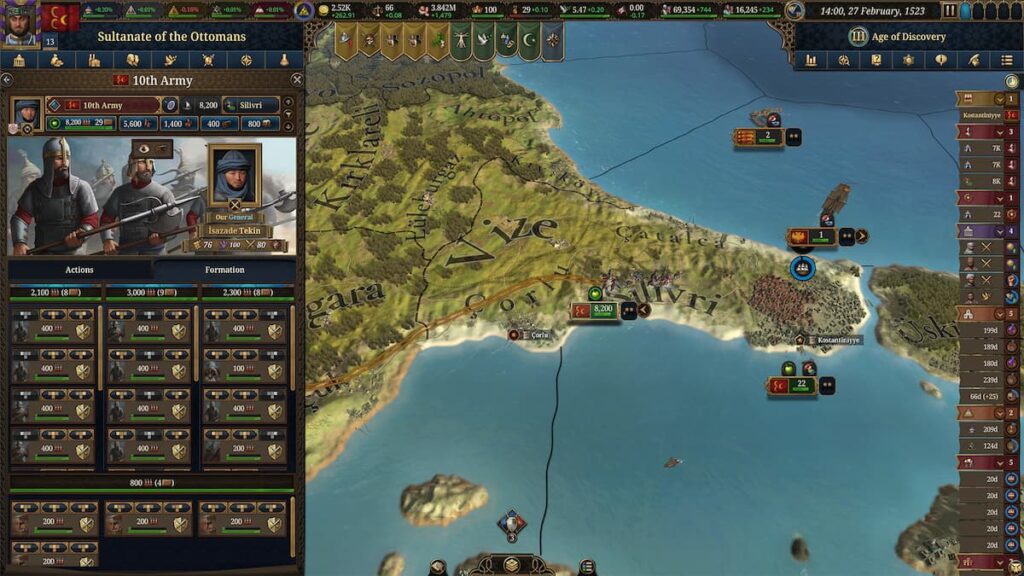Skip To...
We all have that one game or genre we were too scared to try when we were younger. I used to dislike turn-based RPGs when I was a kid, and later, the mere thought of a 4X strategy game like Civilization terrified me. I eventually conquered those fears, but can I conquer grand strategy on the scale Paradox Interactive does? Logistics, diplomacy, global conflict, and internal strife? Dozens of menus, maps, and icons, all in real time and featuring a global scale? Yikes, talk about spooky time. Nothing used to scare me more than the thought of jumping into any one of their legendary franchises. But, I’m here to tell you right now, if you put on a brave face and dare to step into the unfamiliar, you will be greeted with the intensely deep, satisfying, and endlessly replayable sandbox of strategy that is Europa Universalis V.
Set the Stage of History

Now, if you are here for a meticulously laid-out story with carefully crafted beats, then EUV isn’t the experience for you. Paradox’s long-running franchise, like Hearts of Iron and Crusader Kings, allows you to experience history as it was through complex simulations and systems upon systems working in unison, either adhering to history as it was or letting you try to influence or outright alter it in numerous ways. This is where the thrill of your campaigns, the decisions, both small and big, come into play as you create a story worth remembering as you slowly advance through time and eke out small victories when you can.
This approach to strategy is always why Paradox’s titles are considered almost unapproachable by casuals. When you hear a hardcore player talk about it, they seem entranced by the political mischief, wars, and drama that only history itself can provide. EUV succeeds where some prior grand strategy games fail; however, it is bridging the gap between the hardcore zealot and the whistful casual, blissfully unaware of how difficult it is to change religion across a newly conquered nation, especially when nobody knows the country’s mother tongue. This is accomplished through an excellent user interface, slick tutorials, and a curated selection of campaigns that make for great learning experiences, even for brand-new players.
That New Player Smell

Now, I could spend ten thousand words breaking down new systems, intricate changes to the minutia of the moment-to-moment experiences with changes, new additions, or alterations of how the previous games worked, but I also know my limits. One of them enjoys Paradox games but is far from a master. So I will happily point you towards their excellent forum posts where members of the development team do deep dives that returning and hardcore folks will be keen to see and understand. One thing I can speak to, however, is the absolutely superb job EUV does at easing (and I mean EASING) you into its seemingly endless swath of systems, options, and mechanics that will affect everything you can perform on a micro and macro level.
Upon booting the game, you will be offered the option to select and play as a recommended country. From here, you will be given a small list of countries that feature and highlight different gameplay styles, such as expansion, diplomacy, politics, and so on. This is a standout feature, as EUV lets you play as just about any country during the period 1337 to 1837. From small, mostly undeveloped tribal nations to gigantic globe-spanning empires such as the Ottoman, there’s no shortage of options, and based on what you pick, the complexity can vary just as dramatically.
Each facet of the game is then doled out slowly, measured, piece by piece, one by one. You learn about appointing cabinet members, dealing with your own government, establishing small trade and economy, before being thrust into much deeper concepts such as religion, immigration, even the simple act of language, and how that can have a positive or negative effect on the actions you are trying to take and whom you try to take them against. If I sat here and tried to explain it all, it would be quick to overwhelm the senses, and previous Paradox games tend to do that. This new tutorial system, combined with a pretty sleek and intuitive UI design, has really helped create the most gentle barrier to entry of any Europa title.
Polish and Refinement

As somebody who used to give grand strategy fans a lot of flak about being “map games,” I can actually sit back and give credit where credit is due. Considering the enormous amount of information that needs to be conveyed to the player, from your nation and all others surrounding you, the UI does an incredible job of managing and sorting all of that information while also being pleasant to stare at by the time you hit 100 hours played.
Performance is decent as well; various pre-release builds haven’t caused me any issues in single- or multiplayer, and nary a crash has been found. The presentation is further bolstered by small details, such as culturally relevant music and sound design when you zoom in, which go a long way toward adding flavor to the action without being distracting or at the expense of relevant information. I was running this on an older CPU as well, an i9 9900k, which isn’t a slouch, but nowhere near the top of the food chain in this day and age.
Logistics, Diplomacy, and Supply Lines Oh My!

Europa Universalis V is, first and foremost, a triumph of elegant game design. Almost anybody can create complexity for the sake of complexity. It takes true craftsmanship to create a strategy game of this scale and simulation while also making it easy for newcomers to have a great time and feel smarter than their IQ may indicate. It’s an easy recommendation for anybody looking for that deep, but cozy, just one more session addiction for the cold winter months on the horizon.
Review copy given by publisher.
Europa Universalis V (PC Reviewed)
Europa Universalis V is a triumph of clever game design, carefully crafted interface, and best-in-class, engrossing strategy.
Pros
- Optimized well even in late game scenarios
- Endless replayability
- Slick interface and great onboarding
Cons
- The time period might not be everybody's favorite







